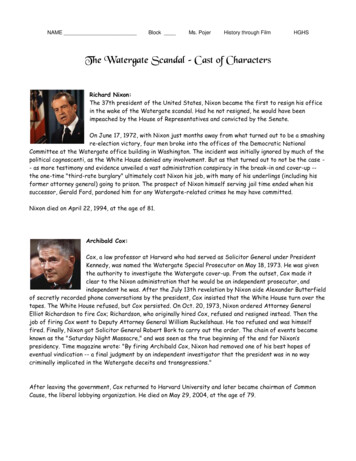
Transcription
NAMEBlockMs. PojerHistory through FilmHGHSThe Watergate Scandal – Cast of CharactersRichard Nixon:The 37th president of the United States, Nixon became the first to resign his officein the wake of the Watergate scandal. Had he not resigned, he would have beenimpeached by the House of Representatives and convicted by the Senate.On June 17, 1972, with Nixon just months away from what turned out to be a smashingre-election victory, four men broke into the offices of the Democratic NationalCommittee at the Watergate office building in Washington. The incident was initially ignored by much of thepolitical cognoscenti, as the White House denied any involvement. But as that turned out to not be the case - as more testimony and evidence unveiled a vast administration conspiracy in the break-in and cover-up -the one-time "third-rate burglary" ultimately cost Nixon his job, with many of his underlings (including hisformer attorney general) going to prison. The prospect of Nixon himself serving jail time ended when hissuccessor, Gerald Ford, pardoned him for any Watergate-related crimes he may have committed.Nixon died on April 22, 1994, at the age of 81.Archibald Cox:Cox, a law professor at Harvard who had served as Solicitor General under PresidentKennedy, was named the Watergate Special Prosecutor on May 18, 1973. He was giventhe authority to investigate the Watergate cover-up. From the outset, Cox made itclear to the Nixon administration that he would be an independent prosecutor, andindependent he was. After the July 13th revelation by Nixon aide Alexander Butterfieldof secretly recorded phone conversations by the president, Cox insisted that the White House turn over thetapes. The White House refused, but Cox persisted. On Oct. 20, 1973, Nixon ordered Attorney GeneralElliot Richardson to fire Cox; Richardson, who originally hired Cox, refused and resigned instead. Then thejob of firing Cox went to Deputy Attorney General William Ruckelshaus. He too refused and was himselffired. Finally, Nixon got Solicitor General Robert Bork to carry out the order. The chain of events becameknown as the "Saturday Night Massacre," and was seen as the true beginning of the end for Nixon’spresidency. Time magazine wrote: "By firing Archibald Cox, Nixon had removed one of his best hopes ofeventual vindication -- a final judgment by an independent investigator that the president was in no waycriminally implicated in the Watergate deceits and transgressions."After leaving the government, Cox returned to Harvard University and later became chairman of CommonCause, the liberal lobbying organization. He died on May 29, 2004, at the age of 79.
Sam Ervin:Ervin was a canny Democratic senator from North Carolina who presided over the specialSenate Watergate Committee hearings in the spring and summer of 1973. His "awshucks" Southern charm -- he often referred to himself as "just an ol' country lawyer" - won over millions of Americans who were glued to their TV sets to watch the hearings.Interestingly, Ervin had compiled a fairly conservative record in the Senate, voting against civil rightslegislation, affirmative action, and giving the vote to 18 year olds. But he was also a staunch champion ofindividual liberties.The committee -- formally called the Select Committee on Presidential Campaign Activities -- began itshearings on May 17, 1973, the goal to investigate the questionable activities of the 1972 Nixon re-electioncampaign. The hearings exposed not only that people close to Nixon were implicated in alleged crimes, butthat the administration had tried to cover them up. It was during one particular committee meeting, on July13, 1973, where White House aide Alexander Butterfield revealed the existence of an elaborate secrettelephone conversation recording system that ultimately led to Nixon’s resignation.Ervin did not seek re-election to a fifth Senate term in 1974, opting instead to retire. He died on April 23,1985, at the age of 88.Peter Rodino:Rodino was a fairly obscure Democratic member of Congress from Newark, N.J., whobecame chairman of the House Judiciary Committee in 1973. His first major order ofbusiness came later that year when he headed the House confirmation hearings ofRepublican House Minority Leader Gerald Ford to be vice president. But once the demandto impeach President Nixon grew, it was the committee's responsibility to open up an impeachment inquiry,which it did in October of 1973.Throughout the hearings, Rodino made it painstakingly clear that he wanted the investigation to be aboutevidence, not politics. When the committee demanded tapes of Watergate phone conversations, what wasturned over by the White House was filled with deletions. But Nixon stood his ground, refusing thecommittee's request. On July 24, 1974, the impeachment hearings became nationally televised. On July 27the committee voted on the first of three articles of impeachment, obstruction of justice. Two days later itapproved a second article of impeachment, this one on misuse of power. On July 30 the third article ofimpeachment passed: contempt of Congress for defying its subpoenas.The full House was on course to impeach the president. Nixon headed that off by resigning on Aug. 9, 1974.Meanwhile, back home, Rodino's district was rapidly going from majority Italian-American to majority black,and there was a lot of pressure for him to retire and allow the district to be represented by an AfricanAmerican. He finally stepped down at the end of 1988. He later was a professor at the Seton Hall UniversityLaw School. Rodino died on May 7, 2005, at the age of 95.
John Sirica:Sirica was the chief judge of the U.S. District Court for the District of Columbia when thecases of the early Watergate defendants landed in his lap. Sirica took the unusual step ofpublicly stating that the defendants were not being completely truthful. He approached thetrials more like a prosecutor than as a judge, promising to impose the maximum sentence onthe Watergate burglars. But his diligence paid off when one of the burglars, James McCord, wrote to Siricain March of 1973 that political pressure was being put on the burglars to plead guilty and keep quiet. (Theother burglars: Bernard Barker, Virgilio Gonzalez, Eugenio Martinez and Frank Sturgis.) Time magazinenamed Sirica its "Man of the Year" for 1973.Interestingly, Sirica was a life-long Republican. He died on Aug. 15, 1992, at the age of 88.Leon Jaworski:Jaworski, a Houston attorney, became the Watergate special prosecutor on Nov. 1, 1973,after the firing of Archibald Cox in what was known as the "Saturday Night Massacre."Once thought by some to be less vigorous in investigating alleged White House crimes,Jaworski proved the doubters wrong when he got a unanimous Supreme Court to orderNixon to turn over the Oval Office tapes.Jaworski returned to Washington, D.C., in 1977 as the special counsel to the House committee investigatingthe Koreagate scandal. He died on Dec. 9, 1982, at the age of 77.John Mitchell:Mitchell was Richard Nixon's former law partner and 1968 campaign manager when he wasnamed as Attorney General in 1969. He quit the Justice Department shortly after theWatergate break-in to head up the president's re-election campaign in '72. In 1974Mitchell was convicted on charges related to the Watergate break-in and subsequentcover-up. Testimony showed that Mitchell approved of both the break-in and the hush money for thedefendants. He served 19 months in prison. Mitchell died on Nov. 9, 1988, at the age of 75.John Ehrlichman:Ehrlichman was President Nixon's assistant for domestic affairs. He also was closelyinvolved with the Watergate "plumbers," and was instrumental in the earlier White House"dirty trick" -- the break-in at the office of the psychiatrist to Daniel Ellsberg, the manwho leaked the Pentagon Papers to the media. Ehrlichman resigned his White House post inApril of 1973 and was later convicted of conspiracy in both the Watergate and Ellsberg cases. He served 18months in prison. He lived for a while in Santa Fe, N.M., later becoming a business consultant in Atlanta. Hedied on Feb. 14, 1999, at the age of 73.
H.R. Bob Haldeman:Haldeman was White House chief of staff under Nixon. Together with John Ehrlichman,they were known as the "Berlin Wall" -- you had to get past Haldeman and Ehrlichman ifyou wanted to see the president. Like Ehrlichman, Haldeman quit his White House jobunder pressure in April 1973 after being implicated in supplying the Watergatedefendants with hush money, was convicted of Watergate-related offenses, and went to prison. Haldemandied on Nov. 12, 1993, at the age of 67.Alexander Butterfield:The head of the Federal Aviation Administration and an ex-Haldeman aide, Butterfielddisclosed the existence of a tape-recording device in the Oval Office. The disclosure,made in July 1973 during the Senate Watergate Committee hearings, ultimately led toNixon's resignation.Charles Colson:White House special counsel who went to prison in 1974 for his involvement in the DanielEllsberg break-in. Colson was also involved in the Watergate cover-up. He is now a born-againChristian and founder of the Prison Fellowship Ministries.Kenneth Dahlberg:Nixon's 1972 Midwest campaign manager, whose campaign check for 25,000 to CommerceSecretary Maurice Stans wound up in the bank account of one of the Watergate burglars.John Dean:White House counsel who during the Ervin hearings warned of a "cancer growing on thepresidency." Later went to prison for his involvement in the cover-up.
E. Howard Hunt:A former CIA agent who joined the Nixon White House in 1971 and became one of the originalplanners of the Watergate break-in. Hunt's phone number was found in an address book ofone of the Watergate burglars, which connected them to the White House for the first time.Spent 33 months in prison.G. Gordon Liddy:In December of 1971, Liddy, a former FBI agent, became the general counsel to theCommittee to Re-Elect the President (CREEP). Considered a mastermind for the WhiteHouse's strategy of "dirty tricks," he was one of the original Watergate planners. He went toprison for his roles in the Watergate and Ellsberg break-ins, and served longer than most ofthe other defendants due to his refusal to testify.Donald H. Segretti:Political operative for CREEP. Involved in political “dirty tricks” for the 1972 Nixon campaign.In 1974, Segretti pleaded guilty to three misdemeanor counts of distributing illegal (in fact,forged) campaign literature and was sentenced to six months in prison, actually serving fourmonths. One notable example of his wrong-doing was a faked letter on Democratic presidentialcandidate Edmund Muskie's letterhead falsely alleging that U.S. Senator Henry "Scoop"Jackson, a fellow Democrat, had had an illegitimate child with a 17-year-old; the Muskie letters accusedSenator Hubert H. Humphrey of sexual misconduct as well.Maurice Stans:Commerce secretary and later the finance chairman for the Committee to Re-Elect thePresident, Stans raised nearly 60 million for Nixon's re-election. He insisted that he hadno knowledge how some of the money he raised wound up in the Watergate cover-up. Did notgo to prison but was fined for receipt of illegal corporate contributions.Rose Mary Woods:The longtime and loyal Nixon personal secretary, Woods took the blame for inadvertentlyerasing 18 1/2 minutes from a tape of a key Nixon phone conversation.
Ronald Ziegler:Ziegler was President Nixon's White House press secretary. Fiercely loyal to his boss, heinitially referred to the Watergate break-in as a "third-rate burglary."Mark Felt:The confidential informant known for 30 years as "Deep Throat" is finally out of theshadows, identified as senior FBI official Mark Felt. But as the last major detail of theWatergate story was revealed, a younger generation strained to understand what the fusswas all about, and others realized they'd forgotten many of the key details. He died onDecember 18, 2008.Bob Woodward & Carl Bernstein:SOURCE: Id 4678527
From the outset, Cox made it clear to the Nixon administration that he would be an independent prosecutor, and independent he was. After the July 13th revelation by Nixon aide Alexander Butterfield of secretly recorded phone conversations by the president, Cox insisted that the White House turn over the tapes.










